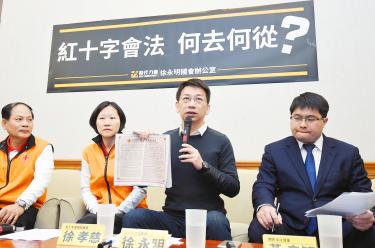The Legislative Yuan should consider abolishing the Red Cross Society Act of the Republic of China (中華民國紅十字會法) to clarify the Taiwan Red Cross’ relationship with the government, New Power Party (NPP) Legislator Hsu Yung-ming (徐永明) said yesterday.
The establishment law of the organization — which said it uses “Taiwan Red Cross” for international purposes, although “Red Cross Society of the Republic of China” is its official name — was passed in 1954. It forbids any other organization from using the international Red Cross symbol, and decrees that the heads of several executive agencies are automatically appointed to its governing and supervisory boards.
“I think now is a great opportunity to abolish the Red Cross Society Act to normalize the organization,” Hsu said, adding that the organization takes responsibility for many government-like functions, while remaining largely unregulated within its “kingdom” of special privileges.
“While I am sure that they do good work, would that somehow stop if the law is abolished? The [Buddhist Compassion Relief] Tzu Chi Foundation also does a lot, but they do not have special laws,” he said, referring to one of the nation’s largest charitable organizations.
The Taiwan Red Cross in recent years has been mired in a series of controversies, including criticism that it overpays executives and was too slow in sending donated funds to Japan following the 2011 tsunami and nuclear disaster.
Taiwan Red Cross president Wang Ching-feng (王清峰) published a half-page front-page advertisement in the Chinese-language United Daily Evening News at her own expense last week to defend the preservation of the organization’s law.
Huang Di-ying (黃帝穎), a lawyer, said the law unfairly grants the Taiwan Red Cross special status relative to other organizations, citing special commemorative stamps which the organization was previously allowed to sell in schools.
Special privileges also include exemptions from most government regulations, including requirements that government ministries approve calls for donations and the organization’s yearly spending plans, Huang said.
“As the nation has a special law and the government backs the organization, making it easier for [the Red Cross] to solicit donations, in theory, it should be subject to more rigorous supervision than ordinary organizations, but in practice, the opposite is true,” he said.
Taiwan Red Cross spokeswoman Lisa Hsu (徐孝慈) said the organization’s establishment law should not be abolished, because it highlights the organization’s claim to international recognition.
While the Taiwan Red Cross is not an official member of the International Federation of the Red Cross, official member organizations in many nations have establishment laws or executive decrees, she said.
“Under current law, our only special privilege is the right to call for emergency donations,” she said, adding that the organization last year had sought the Ministry of Health and Welfare’s approval prior to calling for donations to help Syrian refugees. However, the ministry refused to process their application on grounds that the Red Cross is not required to apply for government approval before issuing donation requests, Lisa Hsu said.
The Red Cross Society Act states the organization can issue calls for donations after gaining approval from its board of directors and supervisors.
The Taiwan Red Cross agrees that its establishment law should be revised, but there is no internal consensus on what should be changed, including whether it should retain its privilege to call for emergency donations without government approval, Lisa Hsu said.
Source: Taipei Times - 2016/02/23





















